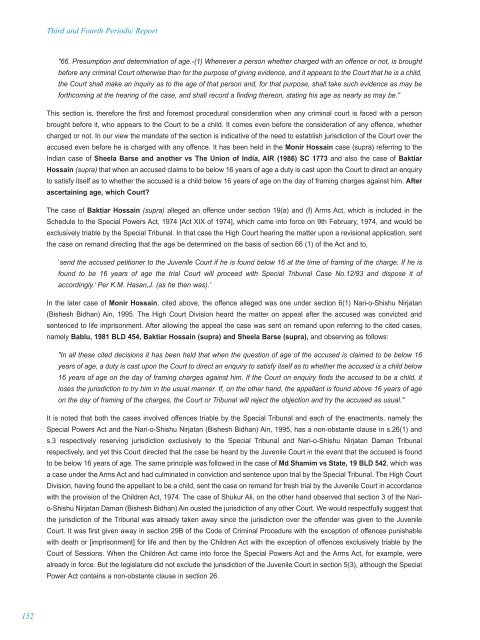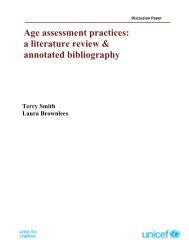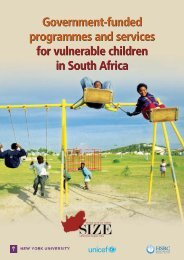Third and Fourth Periodic Report on CRC - Unicef
Third and Fourth Periodic Report on CRC - Unicef
Third and Fourth Periodic Report on CRC - Unicef
You also want an ePaper? Increase the reach of your titles
YUMPU automatically turns print PDFs into web optimized ePapers that Google loves.
<str<strong>on</strong>g>Third</str<strong>on</strong>g> <str<strong>on</strong>g>and</str<strong>on</strong>g> <str<strong>on</strong>g>Fourth</str<strong>on</strong>g> <str<strong>on</strong>g>Periodic</str<strong>on</strong>g> <str<strong>on</strong>g>Report</str<strong>on</strong>g><br />
"66. Presumpti<strong>on</strong> <str<strong>on</strong>g>and</str<strong>on</strong>g> determinati<strong>on</strong> of age.-(1) Whenever a pers<strong>on</strong> whether charged with an offence or not, is brought<br />
before any criminal Court otherwise than for the purpose of giving evidence, <str<strong>on</strong>g>and</str<strong>on</strong>g> it appears to the Court that he is a child,<br />
the Court shall make an inquiry as to the age of that pers<strong>on</strong> <str<strong>on</strong>g>and</str<strong>on</strong>g>, for that purpose, shall take such evidence as may be<br />
forthcoming at the hearing of the case, <str<strong>on</strong>g>and</str<strong>on</strong>g> shall record a finding there<strong>on</strong>, stating his age as nearly as may be."<br />
This secti<strong>on</strong> is, therefore the first <str<strong>on</strong>g>and</str<strong>on</strong>g> foremost procedural c<strong>on</strong>siderati<strong>on</strong> when any criminal court is faced with a pers<strong>on</strong><br />
brought before it, who appears to the Court to be a child. It comes even before the c<strong>on</strong>siderati<strong>on</strong> of any offence, whether<br />
charged or not. In our view the m<str<strong>on</strong>g>and</str<strong>on</strong>g>ate of the secti<strong>on</strong> is indicative of the need to establish jurisdicti<strong>on</strong> of the Court over the<br />
accused even before he is charged with any offence. It has been held in the M<strong>on</strong>ir Hossain case (supra) referring to the<br />
Indian case of Sheela Barse <str<strong>on</strong>g>and</str<strong>on</strong>g> another vs The Uni<strong>on</strong> of India, AIR (1986) SC 1773 <str<strong>on</strong>g>and</str<strong>on</strong>g> also the case of Baktiar<br />
Hossain (supra) that when an accused claims to be below 16 years of age a duty is cast up<strong>on</strong> the Court to direct an enquiry<br />
to satisfy itself as to whether the accused is a child below 16 years of age <strong>on</strong> the day of framing charges against him. After<br />
ascertaining age, which Court?<br />
The case of Baktiar Hossain (supra) alleged an offence under secti<strong>on</strong> 19(a) <str<strong>on</strong>g>and</str<strong>on</strong>g> (f) Arms Act, which is included in the<br />
Schedule to the Special Powers Act, 1974 [Act XIX of 1974], which came into force <strong>on</strong> 9th February, 1974, <str<strong>on</strong>g>and</str<strong>on</strong>g> would be<br />
exclusively triable by the Special Tribunal. In that case the High Court hearing the matter up<strong>on</strong> a revisi<strong>on</strong>al applicati<strong>on</strong>, sent<br />
the case <strong>on</strong> rem<str<strong>on</strong>g>and</str<strong>on</strong>g> directing that the age be determined <strong>on</strong> the basis of secti<strong>on</strong> 66 (1) of the Act <str<strong>on</strong>g>and</str<strong>on</strong>g> to,<br />
‘send the accused petiti<strong>on</strong>er to the Juvenile Court if he is found below 16 at the time of framing of the charge. If he is<br />
found to be 16 years of age the trial Court will proceed with Special Tribunal Case No.12/93 <str<strong>on</strong>g>and</str<strong>on</strong>g> dispose it of<br />
accordingly.’ Per K.M. Hasan,J. (as he then was).’<br />
In the later case of M<strong>on</strong>ir Hossain, cited above, the offence alleged was <strong>on</strong>e under secti<strong>on</strong> 6(1) Nari-o-Shishu Nirjatan<br />
(Bishesh Bidhan) Ain, 1995. The High Court Divisi<strong>on</strong> heard the matter <strong>on</strong> appeal after the accused was c<strong>on</strong>victed <str<strong>on</strong>g>and</str<strong>on</strong>g><br />
sentenced to life impris<strong>on</strong>ment. After allowing the appeal the case was sent <strong>on</strong> rem<str<strong>on</strong>g>and</str<strong>on</strong>g> up<strong>on</strong> referring to the cited cases,<br />
namely Bablu, 1981 BLD 454, Baktiar Hossain (supra) <str<strong>on</strong>g>and</str<strong>on</strong>g> Sheela Barse (supra), <str<strong>on</strong>g>and</str<strong>on</strong>g> observing as follows:<br />
"In all these cited decisi<strong>on</strong>s it has been held that when the questi<strong>on</strong> of age of the accused is claimed to be below 16<br />
years of age, a duty is cast up<strong>on</strong> the Court to direct an enquiry to satisfy itself as to whether the accused is a child below<br />
16 years of age <strong>on</strong> the day of framing charges against him. If the Court <strong>on</strong> enquiry finds the accused to be a child, it<br />
loses the jurisdicti<strong>on</strong> to try him in the usual manner. If, <strong>on</strong> the other h<str<strong>on</strong>g>and</str<strong>on</strong>g>, the appellant is found above 16 years of age<br />
<strong>on</strong> the day of framing of the charges, the Court or Tribunal will reject the objecti<strong>on</strong> <str<strong>on</strong>g>and</str<strong>on</strong>g> try the accused as usual."<br />
It is noted that both the cases involved offences triable by the Special Tribunal <str<strong>on</strong>g>and</str<strong>on</strong>g> each of the enactments, namely the<br />
Special Powers Act <str<strong>on</strong>g>and</str<strong>on</strong>g> the Nari-o-Shishu Nirjatan (Bishesh Bidhan) Ain, 1995, has a n<strong>on</strong>-obstante clause in s.26(1) <str<strong>on</strong>g>and</str<strong>on</strong>g><br />
s.3 respectively reserving jurisdicti<strong>on</strong> exclusively to the Special Tribunal <str<strong>on</strong>g>and</str<strong>on</strong>g> Nari-o-Shishu Nirjatan Daman Tribunal<br />
respectively, <str<strong>on</strong>g>and</str<strong>on</strong>g> yet this Court directed that the case be heard by the Juvenile Court in the event that the accused is found<br />
to be below 16 years of age. The same principle was followed in the case of Md Shamim vs State, 19 BLD 542, which was<br />
a case under the Arms Act <str<strong>on</strong>g>and</str<strong>on</strong>g> had culminated in c<strong>on</strong>victi<strong>on</strong> <str<strong>on</strong>g>and</str<strong>on</strong>g> sentence up<strong>on</strong> trial by the Special Tribunal. The High Court<br />
Divisi<strong>on</strong>, having found the appellant to be a child, sent the case <strong>on</strong> rem<str<strong>on</strong>g>and</str<strong>on</strong>g> for fresh trial by the Juvenile Court in accordance<br />
with the provisi<strong>on</strong> of the Children Act, 1974. The case of Shukur Ali, <strong>on</strong> the other h<str<strong>on</strong>g>and</str<strong>on</strong>g> observed that secti<strong>on</strong> 3 of the Nario-Shishu<br />
Nirjatan Daman (Bishesh Bidhan) Ain ousted the jurisdicti<strong>on</strong> of any other Court. We would respectfully suggest that<br />
the jurisdicti<strong>on</strong> of the Tribunal was already taken away since the jurisdicti<strong>on</strong> over the offender was given to the Juvenile<br />
Court. It was first given away in secti<strong>on</strong> 29B of the Code of Criminal Procedure with the excepti<strong>on</strong> of offences punishable<br />
with death or [impris<strong>on</strong>ment] for life <str<strong>on</strong>g>and</str<strong>on</strong>g> then by the Children Act with the excepti<strong>on</strong> of offences exclusively triable by the<br />
Court of Sessi<strong>on</strong>s. When the Children Act came into force the Special Powers Act <str<strong>on</strong>g>and</str<strong>on</strong>g> the Arms Act, for example, were<br />
already in force. But the legislature did not exclude the jurisdicti<strong>on</strong> of the Juvenile Court in secti<strong>on</strong> 5(3), although the Special<br />
Power Act c<strong>on</strong>tains a n<strong>on</strong>-obstante clause in secti<strong>on</strong> 26.<br />
152
















